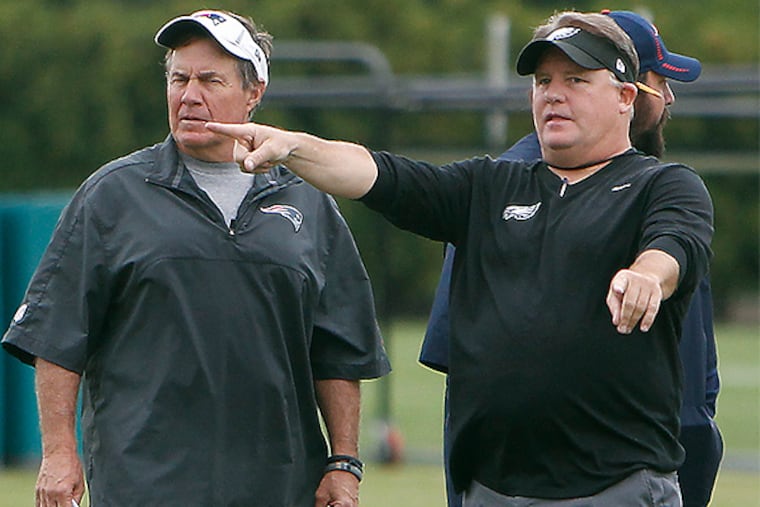Chip Kelly using Belichick playbook on personnel
Bill Belichicks unorthodox moves have resulted in the Patriots sustained excellence, so maybe its not a bad thing.

MALCOLM JENKINS said something last week that offered an interesting prism through which to view the Eagles' frenetic offseason.
"Look at New England," the safety said. "It's always about the team first. They obviously have one of the best quarterbacks on their team, but when you look at their roster, they move people in and out, plug people in and out, because they have a way that they do things. The Patriot Way. That's how they win. I think that's what Chip is trying to do here."
I'm not sure Chip Kelly can pull off the sawed-off hoodie look. And he has way too much fun ribbing reporters to ever become a press- conference minimalist. But when you look at his philosophy in constructing an NFL roster, it's hard not to note a Belichickian influence. And that's something in which fans should take solace. Because for all of the skepticism that Kelly has invited with some of his moves, he also seems to have ripped many of them straight out of the Patriots' Guidebook for Sustained Success.
Take for instance, the autumn of 2010, which was pretty much the most Patriot-like couple of months in history. Coming off a disappointing 10-6 season, Belichick refused to budge on a new contract for Logan Mankins and the Pro Bowl guard held out for the first 6 weeks of the season. In Week 2, the Patriots traded away Laurence Maroney, their leading rusher the previous season. Their biggest move came in Week 5, when Belichick got rid of Randy Moss, who had caught 83 passes for 1,264 yards the previous season. By Week 6, the Patriots were playing without their best wideout, best rusher and best guard from the previous season.
Sound familiar?
Right about now you are probably raising an obvious objection. When Belichick was as far into his Patriots tenure as Kelly is now with the Eagles, he had already won a Super Bowl. And we really didn't start hearing about the whole "Patriot Way" thing until he'd won three of them in his first five years as coach. If Kelly does that, we'll let him replace William Penn with a giant bronze duck.
I'll grant you that. A big difference between Kelly and Belichick is political capital. Players are more likely to buy what you are selling when you've already put a diamond-encrusted ring or three on their fingers. And the presence of one of the three greatest quarterbacks in NFL history greatly increases a coach's margin for error. Letting your top receiver sign with a conference rival is less likely to bite you in the behind when you have Tom Brady than when you have some combination of Mark Sanchez and Sam Bradford (along with the specter of Tim Tebow being a couple of injuries away from an NFL huddle).
What it comes down to is that Kelly's legacy is likely to ride on his understanding of the talent on his roster.
When wide receiver Wes Welker signed with the Broncos after the 2012 season, the Patriots were left with an injured Rob Gronkowski (he would miss the first 2 months of 2013) and Danny Amendola and Julian Edelman, neither of whom had ever reached 900 yards receiving in a season. Edelman ended up catching 105 passes for 1,056 yards, and the Patriots rushed for 2,065 yards while averaging 4.4 yards per carry, with four running backs finishing with at least 75 touches.
Last year, the Patriots traded away the 32-year-old Mankins for a backup tight end and a fourth-round pick. Had they held on to him and Welker, they likely would not have been able to accommodate the additions of cornerbacks Darrelle Revis and Brandon Browner. They proceeded to win another Super Bowl.
The bedrock of Belichick's roster management is solid drafting, particularly in the early rounds. Last season's championship team featured four first-round picks (Nate Solder, Vince Wilfork, Dont'a Hightower, Devin McCourty) and four second-round picks (Gronkowski, Sebastian Vollmer, Jamie Collins, Patrick Chung). All but Wilfork were selected in the previous six drafts. So, seven starters in 12 rounds of drafting. That's efficiency.
Yet Belichick has never been afraid to make a big move, whether that meant trading a second-round pick for Corey Dillon or trading away Richard Seymour for a first-round pick or cutting Wilfork. Whether Kelly is as successful with his moves remains to be seen. But he seems to understand that, in a league that is structured to maximize each team's opportunity to achieve mediocrity, you don't win championships by playing it safe.
Blog: ph.ly/HighCheese